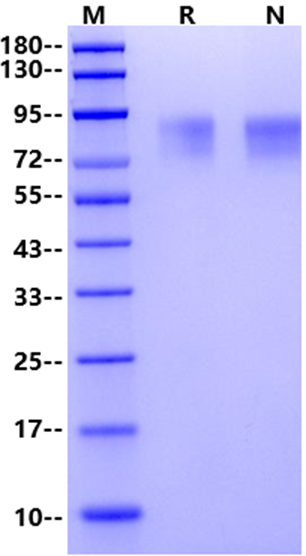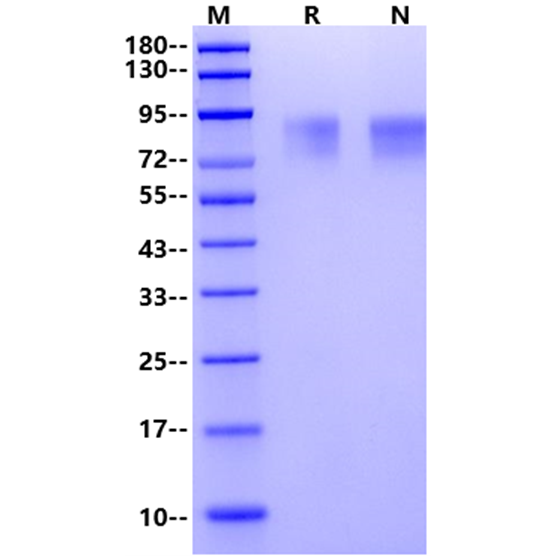Product Details
Product Details
Product Specification
| Species | Mouse |
| Antigen | TrkA/NTRK1 |
| Synonyms | MTC, TRK, TRKA |
| Accession | Q3UFB7 |
| Amino Acid Sequence | Ala34-Gly420, with C-terminal 8*His ASCREVCCPVGPSGLRCTRAGSLDTLRGLRGAGNLTELYVENQQHLQRLEFEDLQGLGELRSLTIVKSGLRFVAPDAFRFTPRLSHLNLSSNALESLSWKTVQGLSLQDLTLSGNPLHCSCALFWLQRWEQEGLCGVHTQTLHDSGPGDQFLPLGHNTSCGVPTVKIQMPNDSVEVGDDVFLQCQVEGLALQQADWILTELEGAATVKKFGDLPSLGLILVNVTSDLNKKNVTCWAENDVGRAEVSVQVSVSFPASVHLGLAVEQHHWCIPFSVDGQPAPSLRWLFNGSVLNETSFIFTQFLESALTNETMRHGCLRLNQPTHVNNGNYTLLAANPYGQAAASVMAAFMDNPFEFNPEDPIPVSFSPVDGNSTSRDPVEKKDETPFGGGGSHHHHHHHH |
| Expression System | HEK293 |
| Molecular Weight | 72-90kDa (Reducing) |
| Purity | >95% by SDS-PAGE |
| Endotoxin | <0.1EU/μg |
| Conjugation | Unconjugated |
| Tag | His Tag |
| Physical Appearance | Lyophilized Powder |
| Storage Buffer | PBS, pH7.4 |
| Reconstitution | Reconstitute at 0.1-1 mg/ml according to the size in ultrapure water after rapid centrifugation. |
| Stability & Storage | · 12 months from date of receipt, lyophilized powder stored at -20 to -80℃. · 3 months, -20 to -80℃ under sterile conditions after reconstitution. · 1 week, 2 to 8℃ under sterile conditions after reconstitution. · Please avoid repeated freeze-thaw cycles. |
| Reference | 1.Nathan Griffin, Mark Marsland, Severine Roselli. The Receptor Tyrosine Kinase TrkA Is Increased and Targetable in HER2-Positive Breast Cancer. Biomolecules 2020, 10. |
Background
The tyrosine kinase receptor TrkA (or neurotrophin receptor kinase 1, NTRK1) has been predominately studied for its role during the development of the nervous system. In developing neurons, TrkA activation upon binding of its ligands nerve growth factor (NGF) or neurotrophin-3(NT-3) results in the stimulation of various tyrosine kinase-induced signaling pathways leading to neuronal outgrowth. In the adult, where neurogenesis is largely reduced, TrkA acts as a pain receptor in sensory neurons and contributes to the transmission of pain signals to the central nervous system. Interestingly, TrkA is also oncogenic and there is accumulating evidence for its overexpression and involvement in cancer progression, including in the form of TrkA fusion proteins as described in lung cancer. Furthermore, TrkA is a therapeutic target in oncology and Trk inhibitors are being tested in several clinical trials.
Picture
Picture
SDS-PAGE



